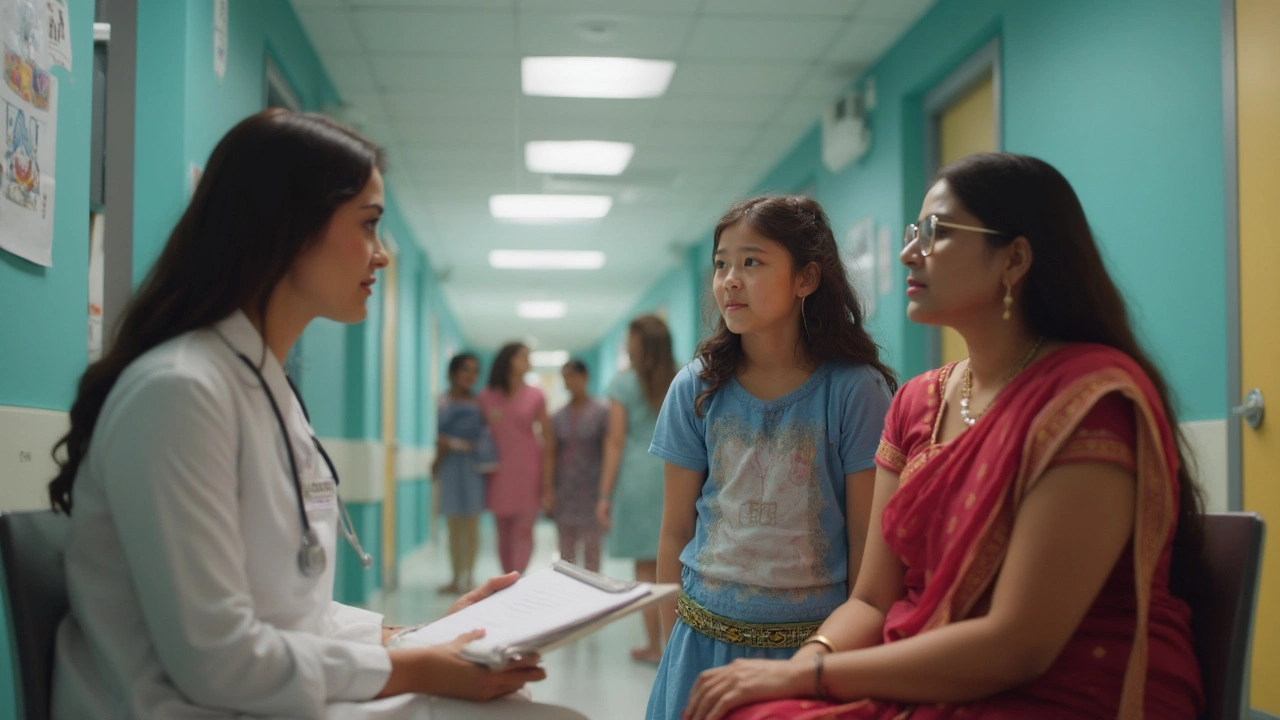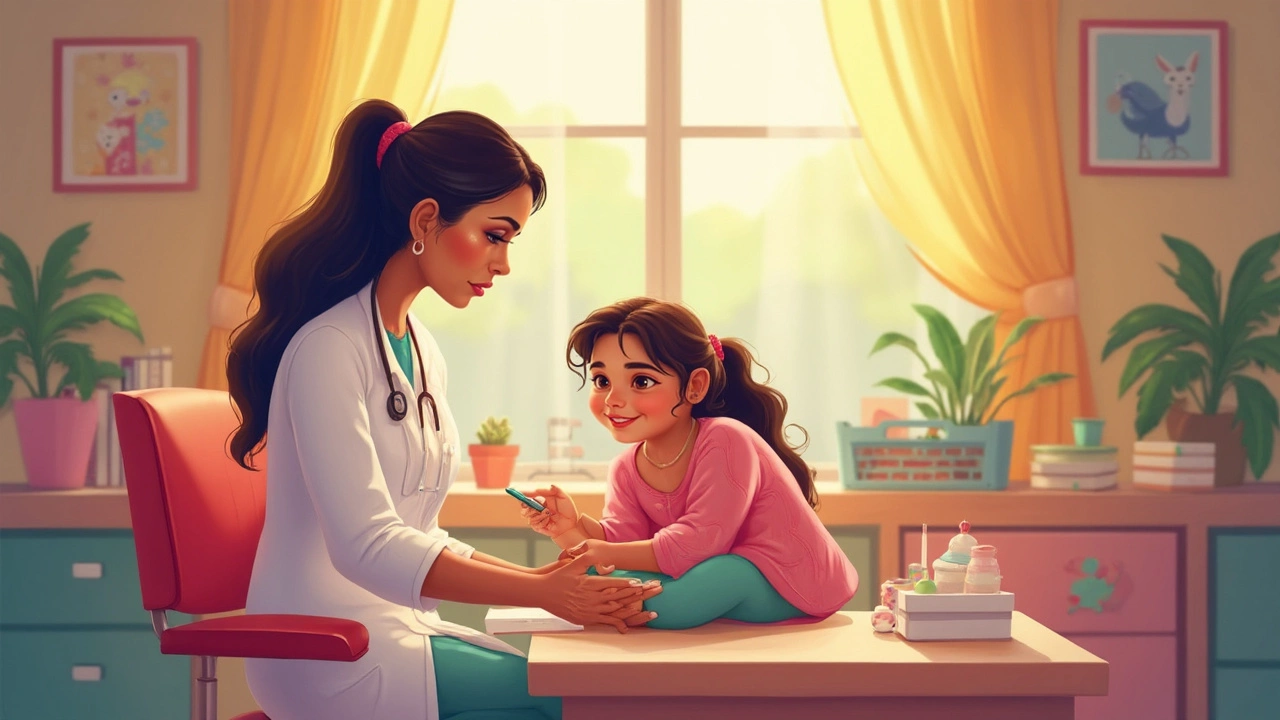If you’re a parent—honestly, even if you’re not—it’s wild how quickly the question pops up: which type of doctor is actually best for girls? There are so many specialties, so many titles, it’s easy to feel overwhelmed. My daughter Tara hit puberty at eleven (which felt freakishly early, though studies show the age is dropping), and suddenly those old doctor visits didn’t feel as simple as when she was four years old and all we worried about was ear infections or skinned knees. It’s a real problem: girls’ health needs change fast, and the world isn’t exactly shouting out clear answers. Turns out, choosing the right doctor isn’t about labels—it’s about timing, comfort, and trust. Let’s get into the details you really want to know.
Pediatricians: The First Health Guides for Girls
Pediatricians are more than just the folks who give vaccines to squirmy toddlers. They’re the backbone for children’s health, from that first shaky breath in the delivery room to when your girl can start driving. Most kids stick with a pediatrician until they’re 18 or even 21. Here’s the cool part: pediatricians specialize not just in runny noses and fevers, but also emotional well-being, puberty questions, and those weird aches nobody else can diagnose.
Girls especially benefit from long-term relationships with their pediatricians. They offer guidance as bodies and minds grow. A good pediatrician brings up topics like periods, acne, mood swings, and even social pressures. The American Academy of Pediatrics recommends that girls start having private time with their doctor around age 11 or 12—without the parent in the room—for open talks about puberty, relationships, and anything she’s not comfortable saying in front of you. That can be a relief for girls who want to ask about things like bras, birth control, or body changes. The best pediatricians know how to keep things age-appropriate and judgment-free.
One thing I hadn’t realized until I raised both a son and a daughter: pediatricians are also gatekeepers for specialized care. If you or your child isn’t sure whether something is 'normal,' this is your go-to. Early breast development, painful periods, sudden weight changes, or mental health shifts all start with a pediatric visit. If the issue is complex, the pediatrician will guide you to the right specialist.
Here’s something parents constantly forget: pediatricians follow evidence-based guidelines. For instance, the Centers for Disease Control and Prevention (CDC) advises that HPV vaccination—a key cancer prevention for girls—start between ages 11 and 12. Pediatricians are usually on top of this, making those awkward questions a little easier.
Beyond medical facts, pediatricians usually know how to talk to a shy or nervous kid, making those necessary check-ups less intimidating. Tara’s pediatrician even used emojis during talks! And sometimes, those early connections lay the foundation for healthier habits and attitudes about doctors going forward.
Gynecologists: When and Why Girls Should See One
Gynecologists aren't just for grown-ups. The American College of Obstetricians and Gynecologists (ACOG) says girls should have their first gynecology visit between ages 13 and 15, even if they’re not sexually active. That shocks a lot of parents, but the reason is simple: periods can be heavy, irregular, or painful. Birth control isn’t just about sex—it’s often prescribed for hormone issues, acne, or severe cramps. Gynecologists know these matters inside and out.
Many girls get nervous when they hear the word “gynecologist.” Debunking a big myth here—not every visit means an uncomfortable exam. First visits are usually just a conversation about periods, body changes, and healthy habits. The doctor might check height, weight, and blood pressure—no getting undressed unless there’s a specific medical reason. Comfort is a top priority. A girl should always feel safe to say if she isn’t ready for an exam, and a respectful gynecologist will listen.
So, what should prompt a visit to a gynecologist? The usual triggers are extremely painful or irregular periods, unexplained pelvic pain, severe acne, or if a girl becomes sexually active and wants birth control. There’s also confidential counseling: girls can ask about their bodies, sex, or relationships in a judgment-free zone. The best gynecologists use simple language and make sure girls and their parents understand every step.
There’s often a gap in care here—a lot of parents aren’t sure when to hand things off from the pediatrician to a gynecologist. If you’re stuck, look for a doctor who’s 'adolescent-friendly.' Some pediatricians have extra training in adolescent health, while certain gynecologists focus just on teens. Your child’s comfort matters more than the doctor’s official label.
Quick tip: Look for practices that advertise as 'teen-friendly' or that mention experience treating girls and adolescents. Reading online reviews can help. Tara’s first gynecologist had Star Wars figurines on her desk and a gentle, no-pressure approach. It makes a huge difference.
Here’s a gold-standard quote:
"Visiting a gynecologist early helps establish good lifelong reproductive health habits—it’s not just about problems, but empowering girls to understand their own bodies." — Dr. Jen Gunter, OB-GYN and author of 'The Vagina Bible'

Adolescent Medicine: Bridging the Gap
Here’s the specialty hardly anyone talks about: adolescent medicine. It’s like a secret weapon for families dealing with the confusing years between childhood and adulthood. These doctors are trained in everything from puberty and periods to mental health and risky behaviors. Their offices are often full of kids who feel too old for cartoons but too young for adult magazines—awkward by design, but also safe.
Adolescent medicine doctors know that girls' challenges are complex. They deal with eating disorders, sports injuries that are common in girls, identity questions, anxiety and depression spikes during puberty, and even substance use. For stuff like irregular periods, severe PMS, or birth control questions, adolescent medicine doctors are basically professional tween and teen translators. This takes a huge weight off kids who struggle to explain sticky stuff to adults who don’t “get it.”
For parents, the upside is huge. You get someone who won’t brush off a panic attack as 'drama,' or call a difficult period 'just growing pains.' These specialists spend extra time talking, listening, explaining options, and looping parents in when appropriate. They’re also good at handling differences: whether that’s gender identity, cultural expectations, or sibling rivalries (my two, Tara and Vihaan, could not be more different).
Adolescent medicine sometimes partners with other specialties. Maybe your daughter has a sports injury that messes with her period—this is the doctor who’ll see the big picture. If you’re not sure whether to stick with the pediatrician or move up to a gynecologist, adolescent medicine fills that gap. The real trick is finding one; they’re not as common as pediatricians. Start by asking your pediatrician for a referral, or check nearby hospitals and major children’s health centers.
To put things in numbers, data from the Society for Adolescent Health and Medicine shows that adolescents are more likely to disclose personal health issues (like sexual activity or emotional struggles) to doctors who specialize in their age group, compared to standard pediatricians or family doctors. That trust can keep a small issue from turning into a crisis.
| Doctor Type | Best Age Range | Typical Topics |
|---|---|---|
| Pediatrician | 0–18 | All children’s health, growth, puberty, vaccines |
| Adolescent Medicine | 10–25 | Puberty issues, mental health, risky behaviors |
| Gynecologist | 13+ | Periods, reproductive health, contraception |
Tips for Finding the Right Doctor—and Building a Lifelong Health Partnership
So, back to the question: Which type of doctor is best for girls? It depends—on age, needs, and comfort. But a few tips can make this search way less stressful, trust me.
- doctor for girls: Prioritize expertise with girls and adolescents. Check for keywords like 'adolescent-friendly' or 'women’s health' on clinic websites.
- Don’t just pick the first available doctor—ask other parents for recommendations. Neighborhood Facebook groups and school nurses know which doctors treat girls with respect and who actually listen to them.
- If your daughter is shy, try virtual visits for first appointments. Tara’s first awkward questions got easier behind a screen, where she could hide her socks with holes and not squirm in a paper gown.
- Consider culture and language. If your family prefers a woman doctor, you have options—and it’s totally okay to find someone else if your girl feels uncomfortable.
- Ask the clinic how they handle sensitive topics and privacy, especially for older girls who want their own space to talk.
- Keep a record of your child’s last check-ups, shot records, and any big issues she’s faced so new doctors can review without wasting time.
- Model healthy communication with doctors—if your daughter hears you asking honest questions or admitting you don’t know something, she’ll be more willing to speak up, too.
There isn’t just one 'perfect' type of doctor for girls—it’s about connecting with someone who sees the whole person, respects her questions, and adapts as she grows. Sometimes a pediatrician is the right guide, sometimes a gynecologist, and sometimes you need that bridge of adolescent medicine. What matters most isn’t the title on the door—but how safe and heard your daughter feels when she walks in.
